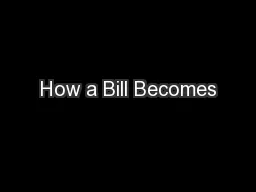PPT-The Powers of Congress & How A Bill Becomes A Law
Author : olivia-moreira | Published Date : 2017-05-05
Powers Granted to Congress Financing Government Collect taxes borrow amp print money Regulating and Encouraging American Trade and Industry Foreign amp domestic
Presentation Embed Code
Download Presentation
Download Presentation The PPT/PDF document "The Powers of Congress & How A Bill ..." is the property of its rightful owner. Permission is granted to download and print the materials on this website for personal, non-commercial use only, and to display it on your personal computer provided you do not modify the materials and that you retain all copyright notices contained in the materials. By downloading content from our website, you accept the terms of this agreement.
The Powers of Congress & How A Bill Becomes A Law: Transcript
Download Rules Of Document
"The Powers of Congress & How A Bill Becomes A Law"The content belongs to its owner. You may download and print it for personal use, without modification, and keep all copyright notices. By downloading, you agree to these terms.
Related Documents














